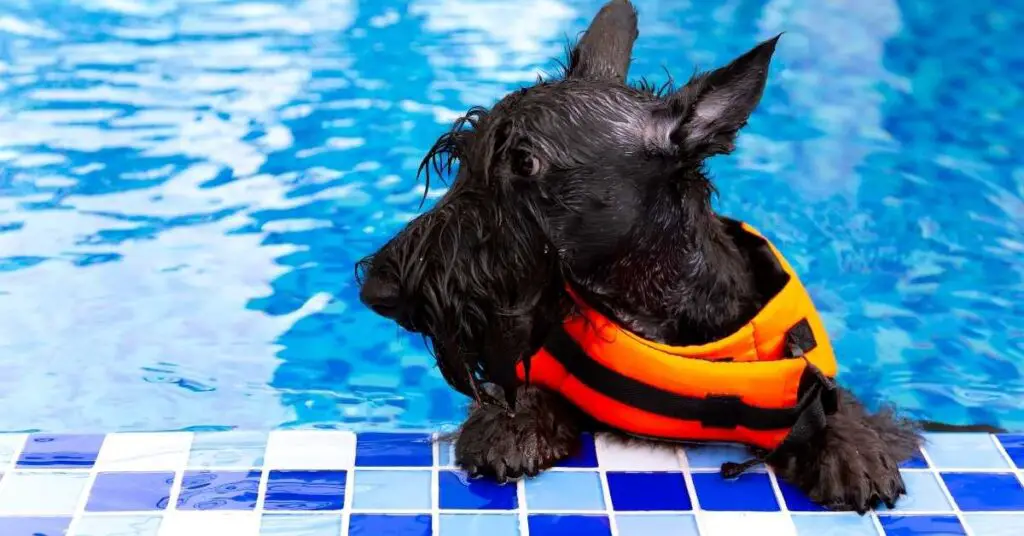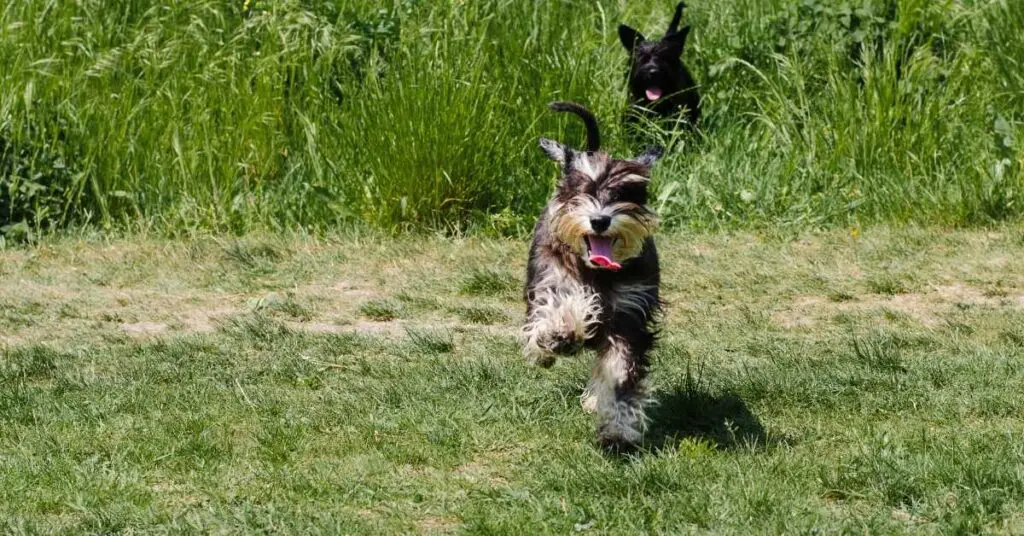We’re an affiliate. We may earn a commission on qualifying purchases through the links on this page. Learn more by reading our disclaimer.
Are schnauzers good apartment dogs? Yes, Schnauzers are good apartment dogs. Especially the miniature and standard-sized schnauzers but you can even keep a giant schnauzer in an apartment if you plan enough exercise time for them. Schnauzers are generally very easy to train, so they can quickly learn to respect the boundaries of living in an apartment. However, no matter what size schnauzer you own, it is important to make sure that your pup gets plenty of exercise and stimulation.
As a dog lover living in an apartment when I was younger, I’ve always wondered which breeds would be the perfect fit for my small space. One breed that has captured my attention is the Schnauzer. With their adorable beards and expressive eyebrows, it’s hard not to fall in love with these charming pups. I went and found a reputable breeder in the area and purchased my first miniature schnauzer. She was an amazing fur ball of energy.
In this blog post, I’ll explore the factors that make Schnauzers a suitable choice for apartment living, as well as some tips to help them adjust seamlessly to their new environment.
Brief overview of Schnauzers as a breed
Schnauzers are a German dog breed, known for their distinctive appearance and friendly nature. There are three types of Schnauzers: Miniature, Standard, and Giant. Each type varies in size, temperament, and specific needs, which we’ll dive into as we discuss whether they’re suitable for apartment living. To learn more about Schnauzers in general, check out this article on are Schnauzers good dogs.
Are Schnauzers Good Apartment Dogs?
Yes, schnauzers make a great apartment dog. The miniature and standard sizes are great choices for an inside dog while living in an apartment or duplex. You can even keep a giant schnauzer as long as you plan enough activities to ensure they get enough exercise.
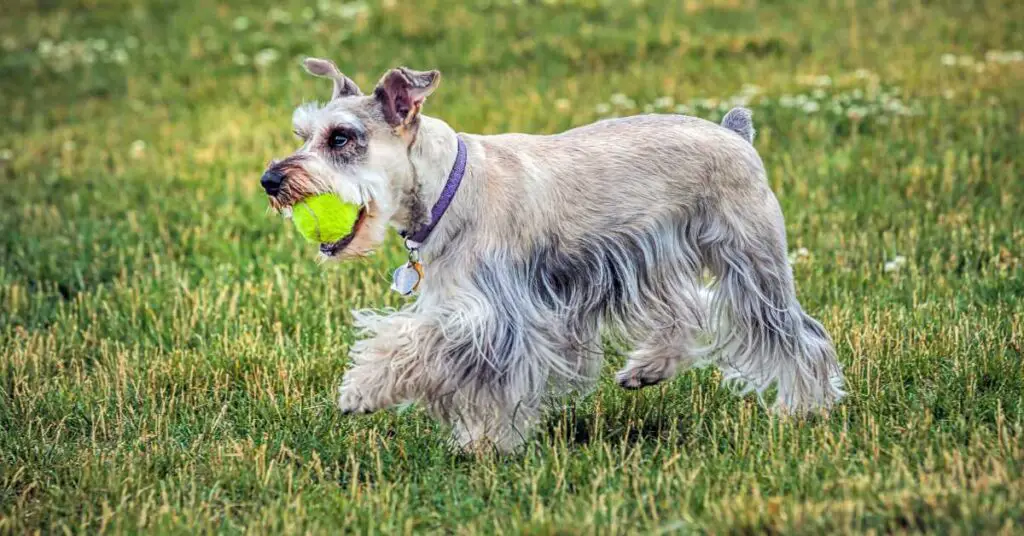
Factors to consider when choosing an apartment dog
When selecting a dog for apartment living, there are several factors to consider, such as:
- Size and space requirements
- Exercise needs
- Noise levels
- Grooming and maintenance
- Socialization and temperament
- Health concerns
- Trainability
How do Schnauzers adapt to apartment living?
Size and space requirements for different Schnauzer types
The size of a Schnauzer varies depending on the type. Here’s a quick breakdown of their average sizes:
| Type | Height | Weight |
|---|---|---|
| Miniature | 12-14 inches | 11-20 lbs |
| Standard | 17-20 inches | 30-50 lbs |
| Giant | 23-27 inches | 55-85 lbs |
Miniature Schnauzers are the smallest and are generally considered the most suitable for apartment living. However, Standard Schnauzers can also adapt well to smaller spaces, as long as their exercise needs are met.
Giant Schnauzers are not ideal for most apartments due to their large size and need for more space but it can be done provided you give them a space or their own.
To learn more about the ideal weight for a Miniature Schnauzer, take a look at this article on how much a Miniature Schnauzer should weigh.
Exercise Needs and Activity Levels of Schnauzers
Schnauzers are active and energetic dogs, with their exercise needs varying depending on their size. Meeting their exercise and mental stimulation requirements is crucial for their overall health and happiness, especially when living in an apartment. Here’s an overview of the exercise needs and activity levels for Miniature, Standard, and Giant Schnauzers.
Miniature Schnauzers
Miniature Schnauzers are the smallest of the three Schnauzer breeds and have moderate energy levels. They require at least 30 to 45 minutes of daily exercise, which can include walks, playtime, or training sessions. Miniature Schnauzers enjoy activities such as:
- Brisk walks or light jogs
- Playing fetch or tug-of-war
- Engaging in interactive games, like hide-and-seek with toys
- Participating in dog sports like agility, obedience, or rally
Standard Schnauzers
Standard Schnauzers have slightly higher energy levels than their miniature counterparts and require at least 45 to 60 minutes of exercise per day. This can be a combination of physical and mental activities to keep them engaged and satisfied. Standard Schnauzers enjoy activities such as:
- Longer walks or moderate jogs
- Playing with other dogs at a dog park
- Engaging in brain games and puzzle toys
- Participating in dog sports like agility, tracking, or scent work
Giant Schnauzers
Giant Schnauzers are the largest and most energetic of the Schnauzer breeds, requiring at least 60 to 90 minutes of daily exercise. Their exercise needs should be a mix of physical activity and mental stimulation to keep their minds sharp and bodies healthy. Giant Schnauzers enjoy activities such as:
- Long walks or hikes
- Running or jogging alongside their owner
- Playing fetch with a Frisbee or ball
- Participating in dog sports like agility, protection work, or herding
When living in an apartment, it’s essential to find creative ways to meet your Schnauzer’s exercise needs. This might include visiting nearby parks, joining a dog walking group, or engaging in indoor games and activities. Providing your Schnauzer with regular exercise and mental stimulation will not only help keep them healthy and happy but also reduce the likelihood of unwanted behaviors, such as excessive barking or destructive tendencies.
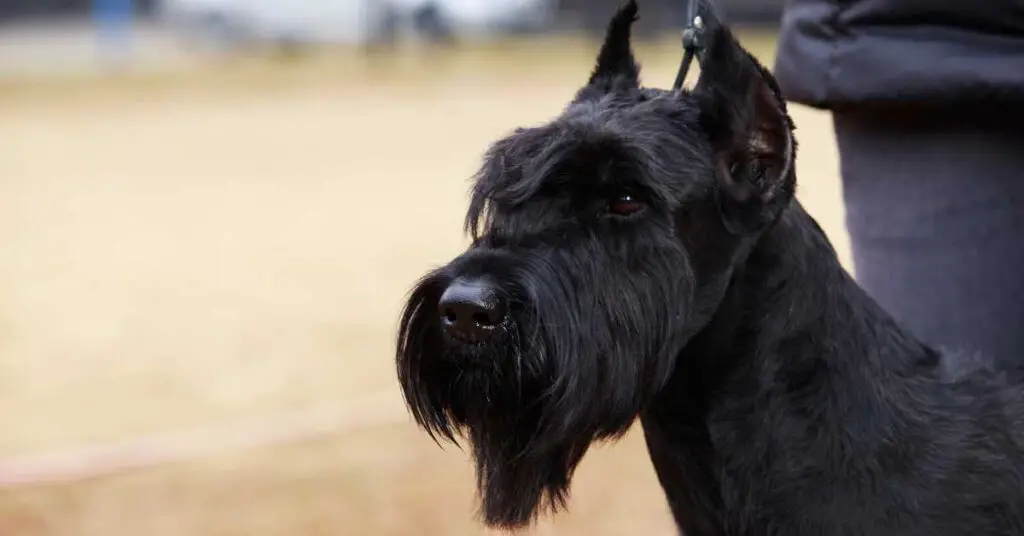
Noise levels and barking tendencies
Schnauzers are known to be vocal dogs, which can be a concern for apartment dwellers with thin walls or close neighbors. However, with proper training and socialization, barking can be managed. It’s essential to address excessive barking early on, teaching your Schnauzer the “quiet” command and rewarding them for being calm and quiet. To learn more about Schnauzers’ barking tendencies, check out these articles on do Schnauzers bark a lot and do Schnauzers howl.
How well do Schnauzers socialize with neighbors, children, and other pets?
Socialization and interactions with other pets
Schnauzers are generally friendly and sociable dogs that get along well with other pets, including cats, when properly socialized. To ensure harmonious relationships between your Schnauzer and other animals, introduce them slowly and under controlled circumstances. For more information on how Schnauzers interact with cats, read this article on are Schnauzers good with cats.
Interactions with children and neighbors
Schnauzers are usually good with children and can be protective of their family. Proper socialization from a young age is crucial to ensure that they become well-adjusted and friendly with neighbors and children.
Here are some tips for fostering positive relationships:
- Expose your Schnauzer to a variety of people and situations early on
- Teach children how to interact with dogs safely and respectfully
- Always supervise interactions between dogs and young children
How easy is it to groom and maintain a Schnauzer in an apartment?
Coat types and grooming needs
Schnauzers have a double coat, consisting of a soft undercoat and a wiry outer coat. Their coat requires regular grooming to prevent matting and maintain a healthy appearance. Miniature and Standard Schnauzers should be groomed every 4-6 weeks, while Giant Schnauzers may require grooming every 6-8 weeks.
Grooming tasks include:
- Brushing to remove loose hair and prevent tangles
- Clipping or hand stripping to maintain coat length and texture
- Trimming around the face, ears, and paws for a neat appearance
Shedding and allergy concerns
One of the benefits of owning a Schnauzer is their minimal shedding. While no dog is truly hypoallergenic, Schnauzers are considered a low-shedding breed, which may be more suitable for people with allergies. Regular grooming will further reduce the amount of loose hair in your apartment. To learn more about Schnauzer shedding, read this article on do Schnauzers shed.
Managing messes and cleanliness
Keeping your apartment clean with a Schnauzer is relatively easy, thanks to their low-shedding coat. However, it’s essential to establish a grooming routine and cleaning schedule to minimize messes. Some tips for maintaining cleanliness include:
- Using washable or disposable puppy pads in designated areas
- Wiping paws with a damp cloth after walks to prevent dirt from being tracked in
- Vacuuming regularly to pick up any loose hair or debris
What are the potential health concerns for Schnauzers in apartments?
Common health issues in the breed
Like any breed, Schnauzers are prone to certain health issues. Some common concerns include:
- Hip dysplasia
- Eye problems, such as cataracts
- Skin allergies
- Dental issues
- Pancreatitis
Regular veterinary checkups and preventative care are essential to keeping your Schnauzer healthy and happy. To learn more about the lifespan of Schnauzers, read this article on how long do Schnauzers live.
Importance of regular veterinary care
Routine vet visits are crucial for early detection and management of health issues. In addition to vaccinations and parasite prevention, your vet can recommend the best diet, exercise, and grooming routines to keep your Schnauzer healthy and comfortable in your apartment.
How trainable are Schnauzers, and what are the best training methods for apartment living?
Potty training and establishing a routine
Schnauzers are intelligent dogs that can be trained relatively easily, including potty training. However, patience and consistency are key to successful training. In an apartment setting, you may need to establish a designated potty area using puppy pads or a litter box if you don’t have easy access to outdoor spaces.
Some tips for successful potty training include:
- Establishing a consistent schedule for feeding, playtime, and potty breaks
- Taking your Schnauzer out first thing in the morning, before bedtime, and after meals
- Rewarding your Schnauzer with praise and treats when they successfully use their designated potty area
Obedience training and teaching good manners
Teaching your Schnauzer basic obedience commands and good manners is essential for harmonious apartment living. Start with simple commands like “sit,” “stay,” and “come,” and gradually work on more advanced commands and tricks. Schnauzers are highly intelligent and eager to please, making them very trainable. For more information on Schnauzer intelligence, check out this article on are Schnauzers smart.
Some tips for successful obedience training include:
- Keeping training sessions short and engaging
- Using positive reinforcement, such as praise, treats, and toys
- Being patient and consistent with your training approach
Dealing with separation anxiety
Schnauzers can be prone to separation anxiety, especially when left alone for extended periods. This can result in destructive behavior and excessive barking. To manage separation anxiety, establish a routine for your Schnauzer, provide plenty of mental and physical stimulation, and gradually increase the duration they’re left alone. For more information on managing separation anxiety in Schnauzers, read this article on can Schnauzers be left alone.
FAQs
Here are some common questions about Schnauzers and apartment living:
Can a schnauzer be left alone?
Schnauzers can be left alone, but they may be prone to separation anxiety if left for extended periods. It’s important to gradually increase the duration they’re left alone and provide plenty of mental and physical stimulation. To learn more about managing separation anxiety in Schnauzers, read this article on can Schnauzers be left alone.
When it comes to leaving you schnauzer alone for short periods of time, it is best to give them a secure place either by setting up a puppy playpen or crate training them. This especially helps when they are puppies as it will limit what they can get into.
What are the cons of owning a Schnauzer?
Some potential drawbacks of owning a Schnauzer include:
- Can be vocal and may bark excessively if not addressed early on
- Require regular grooming and coat maintenance
- May be prone to separation anxiety if left alone for extended periods
Are Miniature Schnauzers good inside dogs?
Yes, Miniature Schnauzers are good inside dogs. They are adaptable to smaller living spaces, intelligent, and trainable. As long as their exercise and mental stimulation needs are met, they can thrive in an indoor environment.
Are Schnauzers low maintenance?
Schnauzers are not entirely low maintenance. While they are low-shedding dogs, they do require regular grooming to maintain their coat’s appearance and health. Additionally, they need daily exercise and mental stimulation to keep them happy and healthy.
Do Schnauzers bark a lot?
Schnauzers can be vocal dogs, and they may bark when excited or alert. However, with proper training and socialization, excessive barking can be managed. To learn more about Schnauzers’ barking tendencies, check out these articles on do Schnauzers bark a lot and do Schnauzers howl.
Which dogs can be left alone for 8 hours?
While no dog should be left alone for 8 hours regularly, some breeds are more tolerant of being alone for longer periods. These include breeds such as French Bulldogs, Basset Hounds, and Greyhounds. However, it’s important to ensure that any dog left alone for an extended period has proper mental and physical stimulation and comfortable surroundings.
Do Schnauzers have high anxiety?
Schnauzers can be prone to separation anxiety if left alone for extended periods. However, with proper training, socialization, and a consistent routine, anxiety levels can be managed.
Are Miniature Schnauzers good for apartments?
Yes, Miniature Schnauzers are well-suited for apartment living due to their small size, adaptable nature, and low-shedding coat. As long as their exercise and mental stimulation needs are met, they can thrive in an apartment environment.
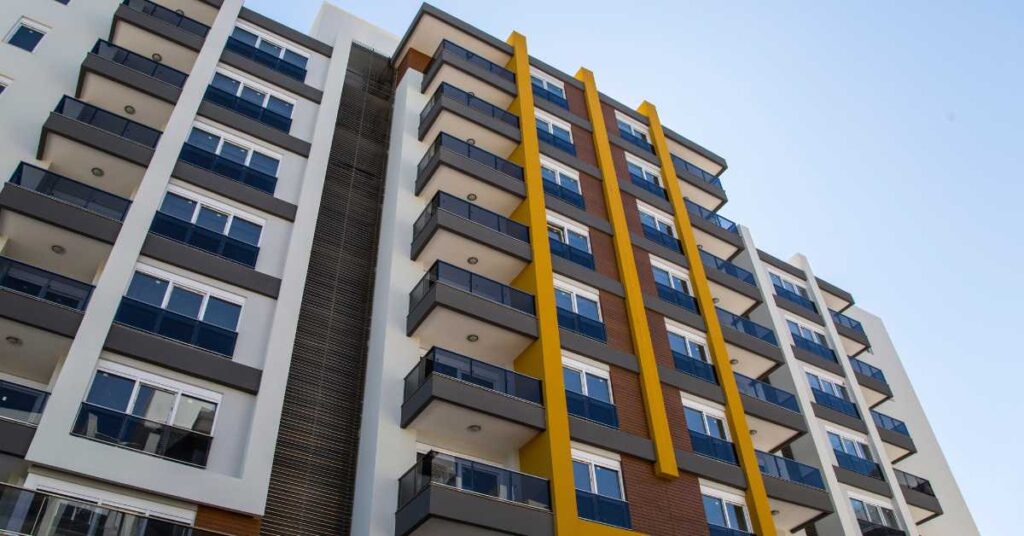
Are Schnauzers easy to train?
Schnauzers are intelligent and eager to please, making them relatively easy to train. However, patience and consistency are key to successful training. Start with simple commands and gradually work on more advanced commands and tricks.
Are Schnauzers hard to potty train?
Schnauzers are not particularly difficult to potty train, but patience and consistency are essential. In an apartment setting, establishing a designated potty area using puppy pads or a litter box may be necessary. Reward your Schnauzer for using their designated potty area and maintain a consistent schedule for feeding, playtime, and potty breaks.
Tips for successfully integrating a Schnauzer into your home
If you’ve decided that a Schnauzer is a perfect companion for your apartment, here are some tips for a successful transition:
- Provide adequate exercise and mental stimulation to keep your Schnauzer happy and healthy
- Establish a grooming routine to maintain a clean living environment
- Socialize your Schnauzer early and often with people, pets, and various situations
- Be consistent and patient with training, addressing any problem behaviors promptly
With the right approach, a Schnauzer can be a loving, loyal companion that thrives in your apartment, providing joy and companionship for years to come.
Final Thoughts
Schnauzers, particularly Miniature and Standard varieties, can make excellent apartment dogs for the right person or family. Their adaptable nature, intelligence, and low-shedding coat make them well-suited for smaller living spaces. However, it’s essential to consider factors such as noise levels, grooming needs, and exercise requirements when deciding if a Schnauzer is a right fit for your lifestyle.

